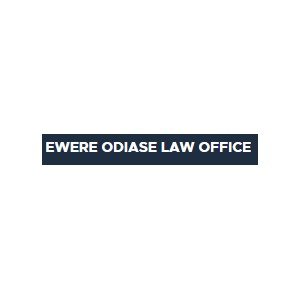Best Landlord & Tenant Lawyers in Asaba
Share your needs with us, get contacted by law firms.
Free. Takes 2 min.
Free Guide to Hiring a Real Estate Lawyer
List of the best lawyers in Asaba, Nigeria
Nigeria Landlord & Tenant Legal Questions answered by Lawyers
Browse our 27 legal questions about Landlord & Tenant in Nigeria and read the lawyer answers, or ask your own questions for free.
- About rent increament
- I was given 2 months and 28 days notice of increament of rent , I refused to pay and I was given 7days quit notice , my rent was increased by 50%
-
Lawyer answer by CO-dunni Law Solicitors
Although this increase is unconscionable, the 7days notice is valid if your rent has expired. Unless you have an alternative arrangement for accommodation. I suggest you find go and negotiate with your Landlord.
Read full answer - My house rent is expiring on march 28 next year and my landlord gave me quick notice to vacate the property on march 28 . My question is by Imo state Nigeria law is he not supposed to give me time to vacate to vacate after my rent is due
- My house rent is expiring on march 28 next year and my landlord gave me quick notice to vacate the property on march 28 . My question is by Imo state Nigeria law is he not supposed to give me time to vacate to vacate after my rent is due
-
Lawyer answer by CO-dunni Law Solicitors
There are several gaps to your question, first you did not mention the date on the Notice, another you did not mention the type of tenancy, whether it is a yearly Tenancy or a bi-annual Tenancy. The Notice to Quit...
Read full answer - I moved into a self-contained apartment in October 2024, and I paid one year's rent. My landlord issued a notice to quit to me on 23rd July 2025. What does the law say about the 3-month notice?
- I want to know if I should insist on a six-month notice or if I should leave on or before 23rd October.I moved into a self-contained apartment in October 2024, and I paid one year's rent. My landlord issued a notice to quit to me on 23rd July 2025. What... Read more →
-
Lawyer answer by Remedium Reel Attorneys
What would generally determine whether the 3 months notice is if there's a written agreement between you and the landlord. (1) If the agreement spells out that you're entitled to 3 months notice, it's valid. (2) If the agreement is...
Read full answer
About Landlord & Tenant Law in Asaba, Nigeria
Landlord & Tenant Law in Asaba, Nigeria refers to the legal regulations and rights that govern the relationship between landlords and tenants in the city of Asaba. These laws are designed to protect the rights of both parties and ensure fair and lawful practices in the rental market.
Why You May Need a Lawyer
There are several situations where seeking legal advice from a lawyer specializing in Landlord & Tenant law can be beneficial. Some common scenarios include:
- Eviction disputes
- Security deposit disputes
- Lease agreement review or negotiation
- Illegal rent increases
- Property condition and repairs
Local Laws Overview
In Asaba, Nigeria, several key aspects of local laws are particularly relevant to Landlord & Tenant relationships. These include:
- The Tenancy Law, which outlines the rights and responsibilities of landlords and tenants
- The Recovery of Premises Law, which regulates the process of eviction and the return of rented premises
- The Rent Control and Recovery of Residential Premises Law, which provides guidelines for rent increases and recovery of residential premises
Frequently Asked Questions
Q: Can a landlord increase the rent without notice?
A: No, a landlord in Asaba must provide written notice of any rent increase to the tenant at least three months in advance.
Q: What can I do if my landlord refuses to make necessary repairs?
A: You have the right to report the issue to the appropriate local housing authority. They can inspect the property and take necessary action against the landlord if they are not fulfilling their obligations.
Q: Is it legal for a landlord to evict a tenant without a court order?
A: No, a landlord cannot evict a tenant without obtaining a court order. They must follow the proper legal procedures for eviction.
Q: How much notice is required for terminating a tenancy agreement?
A: The amount of notice required depends on the duration of the tenancy. If the tenancy is less than six months, 1-month notice is typically required. For tenancies longer than six months, the landlord must give 3 months' notice.
Q: Can a tenant sublet the rented premises to another person?
A: In most cases, subletting requires the landlord's written consent. Without proper consent, subletting may be considered a breach of the tenancy agreement.
Additional Resources
For further assistance and information related to Landlord & Tenant law in Asaba, Nigeria, the following resources can be helpful:
- The Ministry of Housing in Asaba
- The Asaba Rent Tribunal
- Legal Aid Council of Nigeria
Next Steps
If you require legal assistance or advice regarding a Landlord & Tenant matter in Asaba, Nigeria, it is recommended to consult with a qualified lawyer specializing in this field. They can provide personalized guidance and help you navigate through any legal challenges you may be facing.
Lawzana helps you find the best lawyers and law firms in Asaba through a curated and pre-screened list of qualified legal professionals. Our platform offers rankings and detailed profiles of attorneys and law firms, allowing you to compare based on practice areas, including Landlord & Tenant, experience, and client feedback.
Each profile includes a description of the firm's areas of practice, client reviews, team members and partners, year of establishment, spoken languages, office locations, contact information, social media presence, and any published articles or resources. Most firms on our platform speak English and are experienced in both local and international legal matters.
Get a quote from top-rated law firms in Asaba, Nigeria — quickly, securely, and without unnecessary hassle.
Disclaimer:
The information provided on this page is for general informational purposes only and does not constitute legal advice. While we strive to ensure the accuracy and relevance of the content, legal information may change over time, and interpretations of the law can vary. You should always consult with a qualified legal professional for advice specific to your situation.
We disclaim all liability for actions taken or not taken based on the content of this page. If you believe any information is incorrect or outdated, please contact us, and we will review and update it where appropriate.












